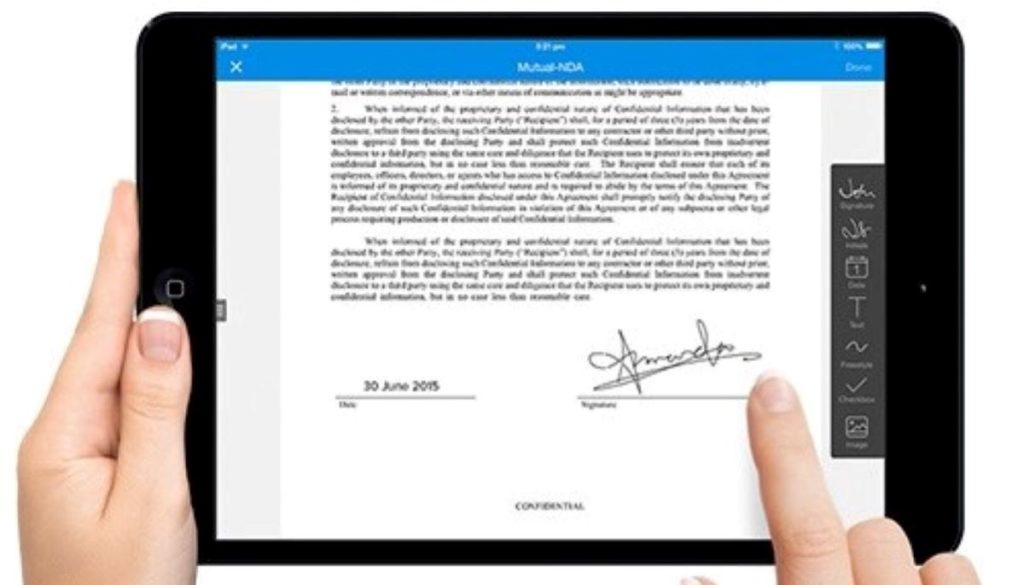Have you ever signed a document using an electronic signature? Then you are acquainted with its convenience and security. In this post, we talk about some of its useful benefits and how you can take advantage of them in your business.
More and more businesses are now using the electronic signature, as it helps speed up processes and provides great convenience. These days, many companies need to carry out administrative procedures electronically. This makes it necessary to obtain a digital certificate.
For these reasons, companies both large and small are now using the e-signature, or electronic signature. If your company is not already using one, it’s time for you to obtain one.
What Is an Electronic Signature?
The electronic signature allows people to sign a document digitally in a way that provides the utmost security. This is convenient, because the person doesn’t have to be present in a particular location to provide their signature on a document.
Instead, the signer can simply send a set of data in electronic form, entering it together with other data that can be used as a means of personal identification.
Now You Can Sign Documents Digitally
In short, a digital certificate, along with an electronic signature, allows a person to prove their identity through a secure network. In this fashion, they can sign documents digitally.
Surprisingly, in many cases, businesses are still not using this convenient instrument as much as they could. Therefore, if you are just now hearing about the electronic signature (or e-signature), or if you have not been using it before now, here are the four important uses of the e-signature you might not be taking advantage of.
RELATED ARTICLE: 3 WAYS TO PROTECT EQUIPMENT AND PRODUCTS OF YOUR HOME-BASED BUSINESS
Four Ways to Use the Electronic Signature
1. Electronic Invoicing
Businesses that have the use of an electronic signature certificate can create and sign electronic invoices. This can add a great deal of ease to your company’s accounting practices.
For example, let’s say you have been asked by the city council of the town where your business is located to submit an electronic invoice in order to request payment for your services to the city. Without an electronic signature, you would not be able to submit your invoice in the format the city requires.
On the other hand, if you do have an electronic signature, you will be able to submit bids and invoices to city offices. This could expand your company’s target demographic to now include civic offices. Therefore, having an electronic signature can make your entire business easier to run and more profitable in the long run.
What’s more, electronic invoices are faster and more convenient for businesses to send than paper invoices.
2. Email Signatures
Usually, the signature on an email refers to the data that appears at the end of that document. This simply indicates who sent the email and gives that person’s contact information. However, did you know that you can also use the electronic signature to sign an email message that you send from Outlook, Gmail, or another provider of this type of service?
But why should you bother with adding your electronic signature to an email?
Simply put, an electronic signature on an email just adds another layer of security. In this way, the recipient can be certain that it was truly you who sent the message.
Of course, you might not want to sign all of your email messages with an electronic signature. However, if you’re emailing a message of a highly sensitive or confidential nature, an e-signature could be really important.
3. Co-Signatures on Documents with Several Participants
Another way to use the electronic signature is with a digital certificate along with the e-signatures of several participants on, for instance, a contract.
Alternatively, members of a committee might all need to sign the minutes of a meeting they held. Signing electronically can give all of the busy members of that committee the ability to sign the meeting minutes in a timely fashion, as their bylaws surely require.
In the example above, all members sign as equally important members of that committee. Therefore, it is important to differentiate this type of signature from the signature in cascade.
In the cascade format, a particular signer validates the signatures of the other participants with his or her own e-signature. For example, a notary public validates the signatures of the parties who sign the document that the notary is notarizing. Today, this can all be accomplished through electronic notarization.
4. Data Encryption with Electronic Signatures
In this world where cybercriminals are everywhere looking for the vulnerable to prey upon, encryption of documents with electronic signatures has become the ultimate security solution. Essentially, this method preserves the security of documents against cyber theft.
Provide Your Business with Greater Security with an Electronic Signature
So if you want to provide your business, your employees, and your clients and customers with more convenience as well as more security, look into obtaining an electronic signature system for your company.

